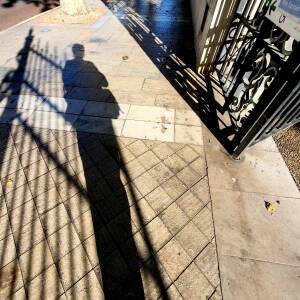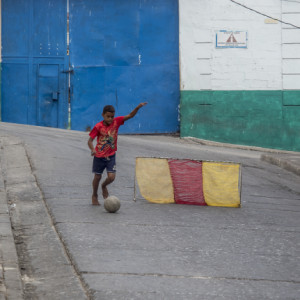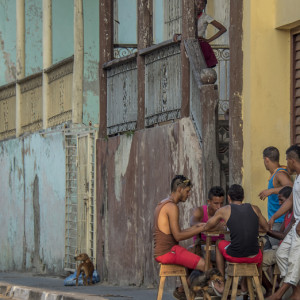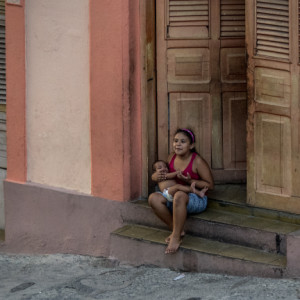Scratching some surfaces
We’d contemplated missing Santiago as it’s a significant detour from our journey to Havana (actually it’s going in the opposite direction) and because the guide book said that the street hustle – begging and being propositioned – was an unbearable problem. What a mistake that would have been! Santiago is vibrant, buzzing and full of colour and music and I took 550 photos today, few of which I’ve wanted to delete.
Our steep walk down to the sea and its welcome breezes took us past some shockingly damaged houses, roofless and crumbling from Hurricane Sandy which hit Santiago hard in 2012. Huge numbers of buildings were damaged, 15,000 people lost their homes and eleven died, almost unheard of in Cuba whose hurricane evacuation strategy is admired worldwide. It took about six months for the army to get the city centre back to normal – though the young trees in the city’s parks and squares can't provide the shade that the mature uprooted trees used to – but there is still a lot to be done outside the centre. We watched workers creating a new seafront: building rough curved planting beds from blocks, covering them with smooth concrete, filling them with soil, and planting palms.
We hauled ourselves through the heat (this week’s heatwave – 32° instead of 25° – has Cubans melting as well as us) back up to a viewpoint over the port. We were happy just to sit but a local, Miguel, was keen to tell us about it. He pointed out the refinery for Venezuelan oil that has been part of Cuba's gradual recovery from the ‘special period‘ – four grim years when the collapse of the Soviet Union deprived Cubans of 80% of their exports and imports. I was surprised when Miguel identified the soap factory. Before we left the UK we were told by previous tourists that soap is all expensively imported so we should take some to give people, and quite a few people on the streets have asked us for soap. But no, Cuba makes its own soap. However, it can be bought only with CUC, not with national pesos. The CUC was a clever system when it was introduced – a separate currency that tourists must use which is exchanged at 25 times the rate of national currency, thereby ensuring that tourists pay more for travel and accommodation than Cubans do. Long distance buses and most hotels are run by the state so the government gets tourist money but over the last few years rules about private entrepreneurship have been relaxed so individual Cubans can now use their cars as taxis or open their homes to tourists. These Cubans earn the expensive currency and a big wealth divide is growing between them and state employees: teachers, health workers, civil servants...
Miguel told us about the weekly food rations we’d seen delivered to Ana’s house in Holguin. Every Cuban gets a small ration of rice, beans, bread, oil, coffee and sugar. Miguel, on a state salary, does not earn enough to buy much more and although the rations mean that he and his family don’t starve, they do go hungry. Sometimes, he told us, there is not enough water to drink. We’ve seen no water shortages but Miguel told us that the water supply, metred, is on only about once a week. Households providing accommodation for tourists fill the very large water tanks they have on their roofs; ordinary people put as much water as they can afford into their much smaller tanks. We’ve seen them perched on roofs or balconies. They are often oil drums.
Listening to Miguel talking about not being able to give his children enough food or water (though they have a TV) was distressing. Is all this true? He told us about his mother dying from asthma. Hospital is free but medication is not. He and his daughter also have asthma and he has to pay for the inhaler top-ups in CUCs, not national currency. Was this a highly sophisticated form of begging? It didn’t seem so. I asked whether Cubans were able to talk about the realities of life in Cuba. He said they have to be careful. He could talk here, away from other people, but not on the street where he risked being stopped by a soldier, even though the soldier may well also be hungry.
I offered him a cheese roll I had for lunch. He refused but when I showed him I had two he was prepared to accept. He refused to take a drink from my water bottle – 'in Cuba water is personal' – but was almost in tears when we filled his drinking cup. He said he would keep it for lunch, a meal he does not usually have.
When we left we were feeling very dejected. It took encountering some more music, bouncing out of the courtyard of a cultural centre, to haul us back. An old French street organ, a set of güiros (notched gourds), bongo drums, snare drums and cowbells. It looked like they were practising for a later event – the audience was just four or five people who’d followed their ears. I wondered whether these exuberant musicians were also hungry. They were thin but full of energy and infectious laughter. But, but, who knows?
We decided to get away from the city for a bit to Jardín de los Helechos, a few kilometres out. It can be reached by public transport but we are not supposed to use either the national peso buses or the lurching trucks crammed with people who hold tight and sway as they weave along the road, so we haggled for a taxi. The garden was a haven: dense ferns, hanging mangos, orchids growing in suspended shoes, humming birds the size of butterflies, and peace. Space to breathe. When it closed the manager kindly flagged down a national-peso communal taxi back to town for us.
And then Alejandro, a peace-and-love Rasta who tried to persuade us to give him CUC to buy balloons for his alleged daughter's alleged birthday and who was very definitely not all peace-and-love when we refused.
We wandered round the hilly area where we’re staying watching the evening activity: workmen carrying building materials up a road so steep it’s stepped; a man flattening discarded cans with a large stone, presumably to sell for the metal; adults talking through doorways or chatting on benches with half an eye on playing children; a child busy on a doorstep, writing; a group of young men playing chess on the pavement exchanging gazes with a young woman on a balcony just above them.
We spent the fading light on our own temporary roof, watching the area around us slow into night.
Several extras.




Comments
Sign in or get an account to comment.


